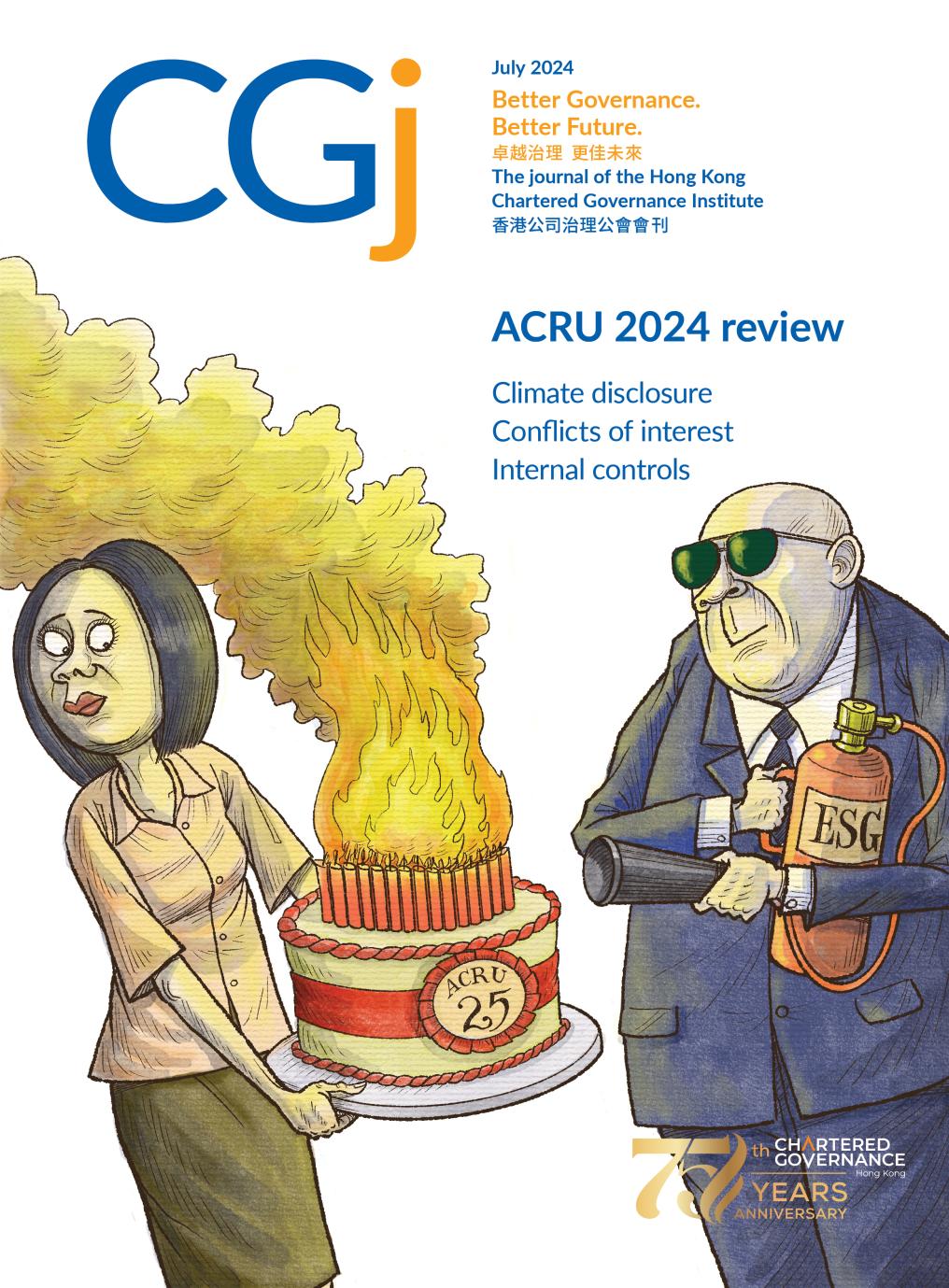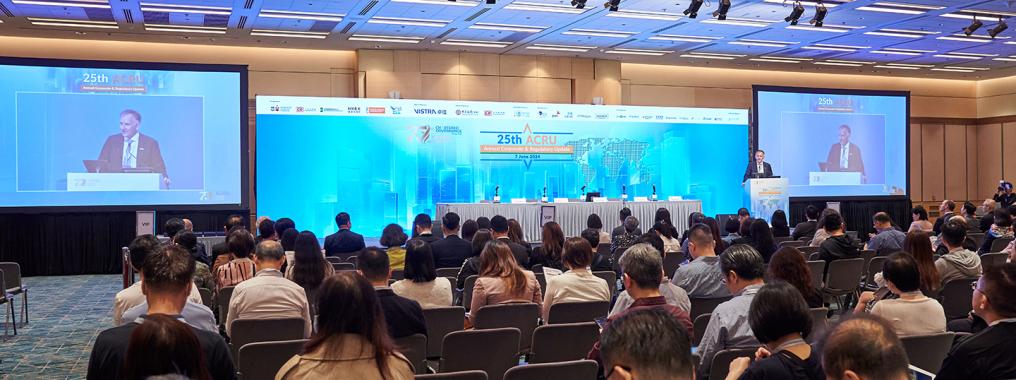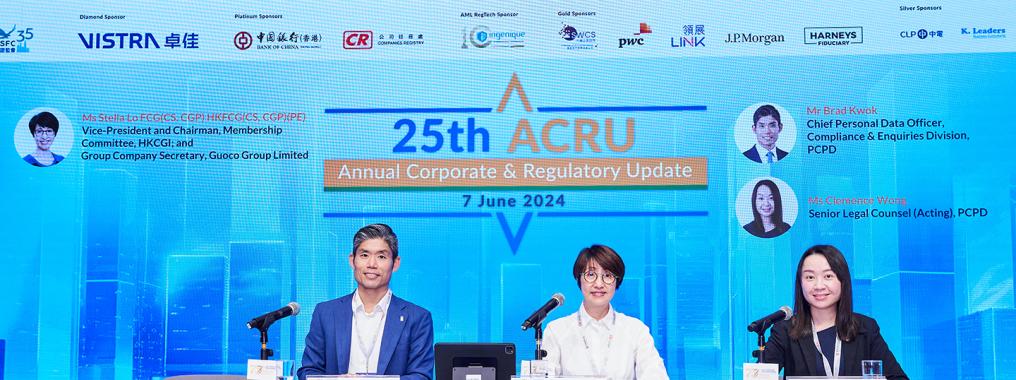This third and final part of our review of ACRU 2024 looks at the leading compliance and governance trends that should be on the watch list of governance professionals in the year ahead.
Highlights
- the trend for greater collaboration and sharing of information between regulators is improving the efficiency and effectiveness of their enforcement activities
- the enforcement approach of the Competition Commission is based on substance over form – whatever label organisations seek to give to their behaviour, the essential question is whether or not the competitive process is being harmed
- attempting to bury bad news, or to put a positive spin on market communications, can constitute making misleading disclosures
The regulatory landscape, both locally and globally, continues to evolve at a rapid pace and the Institute’s latest ACRU was a useful reminder of the many issues that will be high on the agenda for governance professionals in the year – and the years – ahead.
Regulatory collaboration
Like last year, the ever-closer collaboration between regulators was a central theme of this year’s ACRU. The presentation by Kenneth Luk, Senior Director, Enforcement Division, Securities and Futures Commission (SFC), confirmed that this trend is improving the efficiency and effectiveness of enforcement activities.
Mr Luk emphasised that the collaboration between the enforcement teams of the SFC and Hong Kong Exchanges and Clearing Limited (HKEX) has resulted in a disciplinary process that offers both the fairness of due process in the criminal cases handled by the SFC, and faster outcomes and remedies for the disciplinary actions undertaken by HKEX.
‘While some enforcement outcomes and remedies can only be obtained through commencing legal proceedings by the SFC, many corporate misconduct cases can be appropriately and effectively dealt with by HKEX,’ he said.
There has also been a trend for greater collaboration with regulators outside Hong Kong. For example, crucial evidence in the recent case against Global Uin Intelligence Holdings Ltd, a company based in Singapore but listed on the GEM market in Hong Kong, was obtained with the assistance of the Monetary Authority of Singapore.
The SFC has also been collaborating with other regulatory bodies within Hong Kong. For example, Hong Kong’s first tripartite regulatory operation by the SFC, the Accounting and Financial Reporting Council and the Independent Commission Against Corruption, which is still ongoing, involves two Hong Kong listed companies on suspicion of falsifying corporate transactions totalling HK$193 million.
‘Our partnership with other regulators allows us to pool our resources, expertise and intelligence to bring swift enforcement actions against individuals and corrupt corporate practices that undermine market integrity and erode investor confidence,’ Mr Luk said.
The presentation by Charles Chan, Director, Enforcement Division, SFC, added further detail to this picture, with reference to cases involving regulators in Hong Kong and the Chinese mainland.
One of the main challenges of cross-border investigations is the need to collect relevant data held outside Hong Kong. In the Changgang Dunxin Enterprise Co Ltd case, Mr Chan explained, the SFC was assisted by the China Securities Regulatory Commission to independently retrieve bank records in the Chinese mainland. This demonstrated that the bank records in that case had been fabricated.
Nevertheless, another hurdle to cross-border enforcement actions is the difficulties involved in enforcing court orders against individuals not resident in Hong Kong. In the Changgang Dunxin case, the SFC has been able to secure a court order against a former executive director and chief financial officer (CFO) of the company, while the case against three other directors is still ongoing. The former executive director and CFO has been ordered, amongst other things, to pay the company the full misappropriated sum of HK$163 million (with interest), notwithstanding the agreement of the court and the SFC that there is no evidence to suggest that he has personally received any of the misappropriated funds.
Competition compliance
In his ACRU presentation, Lester Lee, Executive Director (Legal Services), Competition Commission (Commission), outlined the fundamental principles involved in competition law and enforcement, and gave practical guidance on how organisations can minimise the risk that they may become involved in the Commission’s enforcement work.
Cardinal principles of competition law
The first cardinal principle of competition law, Mr Lee said, is that the law is there to ensure a level playing field for firms to compete in an open market and the fact that a firm is driven out of the market is not necessarily an indication that there is a problem with the competitive process in the market. ‘The law is there to protect competition, not competitors,’ he said, ‘and survival of the fittest is the law of any functional economy.’
The second cardinal principle is that the law is concerned with substance rather than form. This is critical to bear in mind in terms of the approach the Commission will take in its enforcement actions.
Mr Lee cited the example of a company wanting to restrict the ability of downstream customers to buy their products below a certain price. This will generally be deemed as resale price maintenance, which contravenes the First Conduct Rule of the Competition Ordinance. If a company calls its arrangements ‘a recommended reseller price’, or ‘a suggested retail price’, this does nothing to alleviate its liability. It doesn’t matter what label you put on the particular conduct, it’s whether or not as a matter of substance the arrangement harms competition. The Commission looks at whether there are contractual provisions and monitoring of the resale price maintenance, and whether the perception of the downstream customer is that there is a hard requirement they must follow.
‘When we talk about the enforcement of competition law, it’s not just the label or the form of the conduct that we look at, it is actually the substance that matters. The essential question, ultimately, is whether or not the competitive process is being harmed. You can call your conduct a cat, but if it is a dog it will still bark,’ Mr Lee said.
Key takeaways for senior managers
Mr Lee’s presentation focused on three key takeaways for senior managers.
- Don’t cheat, compete. There is an economic incentive for firms to cooperate instead of competing, but that is unlawful in no ambiguous terms under the Competition Ordinance.
- Consider the consumer’s perspective. Mr Lee urged anyone in doubt about whether any particular behaviour is anti-competitive to consider it from the consumer perspective – is what you are doing ultimately harmful to the consumer?
- Report to, and cooperate with, the Commission. Mr Lee also urged senior managers to immediately report any conduct they suspect to be anti-competitive to the Commission and to cooperate with the Commission when under investigation. He pointed out that the Commission has a leniency programme to incentivise early reporting and cooperation. Under this programme, organisations can get immunity from prosecution or reductions in any penalties.
The value of staff training
Mr Lee concluded his presentation with a cartel detection game based on real-life examples of collusion between competitors. He presented a slide showing three supposedly ‘independent’ bids that were faxed to the tendering firm. The identical time charts at the top of the faxes alerted staff to the fact that the bids were sent from the same fax machine. In a second example, the collusion was uncovered because two supposedly separate bids were sent in the mail, but the envelopes bore identical handwriting.
This cartel detection game has a serious side, Mr Lee pointed out. He emphasised that the message for ACRU participants is the value of training frontline staff to be able to detect the red flags of anti-competitive behaviour.
Corporate reporting
Quality financial reports are critical to an informed and efficient market, and several speakers at this year’s ACRU focused on corporate reporting issues.
Late publication of financial results
Patrick Yu, Senior Vice-President, Listed Issuer Regulation, Listing Division, HKEX, addressed the issue of the timeliness of listed issuers’ financial reporting.
There was a slight increase in the number of companies failing to publish their financial accounts on time this year. Trading was suspended for 70 listed companies (up from 59 in 2022) with a year-end of 31 December 2023. The main reason was that they couldn’t complete the audit in time.
Mr Yu made the point that if companies find themselves in this position they have an obligation to properly inform the market about the reasons for the delay. In its review of issuers’ announcements, HKEX observed instances where the issuers used boilerplate language and where important information for investors – such as what information was still missing, the materiality involved and whether there had been disagreements with the auditors – was lacking. Mr Yu urged issuers to improve the level of their disclosures in any late publication of financial results announcements.
Mr Yu’s presentation also introduced Hong Kong’s new treasury share listing regime and covered a number of regulatory reminders on issues such as board diversity, e-registration of prospectuses, disclosure of consideration for M&As and financial filings through HKEX’s e-submission system.
Maintaining proper internal and financial reporting controls
In January this year, HKEX published its latest report on listed companies’ financial statement disclosures. William Wong, Head of Accounting Affairs, Listing Division, HKEX, updated participants on the findings and recommendations of the HKEX Review of Issuers’ Annual Reports 2023 (Review).
The Listing Division undertakes its annual review as part of its monitoring activities, and it focuses both on issuers’ compliance with the Listing Rules and relevant accounting standards in their reporting, but also, more generally, it considers whether information was adequately and sufficiently disclosed to allow shareholders to properly assess the matters reported on.
Mr Wong said that HKEX was pleased to see a substantial decrease in problematic lending transactions and a gradual improvement in issuers’ disclosure of their moneylending activities since it started to monitor this area three years ago.
Nevertheless, the Review drew attention to deficiencies in issuers’ risk management and internal control systems. The key recommendations, Mr Wong said, for management in general and the audit committee in particular, are that:
- management needs to establish a policy to identify risks emerging from changes in the external environment
- management should, under the audit committee’s oversight, develop appropriate control systems to mitigate identified risks and to regularly review the adequacy of these systems
- issuers should properly plan their audit as early as practicable – agreeing on audit fees, preparing a detailed audit plan and informing the auditors of significant areas of concern, and
- in the event of a change of auditors, issuers should be mindful of the additional time required by the new auditors.
Communicating bad news
Jon Witts, Head of Enforcement, Listing Division, HKEX, was another ACRU speaker who addressed corporate reporting issues. He warned that attempting to bury bad news, or to put a positive spin on market communications, can constitute making misleading disclosures.
‘If your business isn’t working as well as you’d like it to, it’s not okay just to bury that news and pretend it’s not happening. Also, there’s a temptation for some directors when they’re looking at some bad news to try to gloss over it so that they can get the good news story out there,’ he said.
He cited a case relevant to this issue. In 2021, China Haisheng Juice Holdings Co Ltd made a series of announcements relating to a disposal. As a major transaction, the disposal was subject to the Listing Rule requirement to obtain shareholders’ approval as a condition prior to completion. In fact, the company completed the disposal before taking steps to seek shareholders’ approval. This was a breach of the Listing Rules and Mr Witts highlighted the way that the announcements compounded the breach by deliberately misleading shareholders about the actual situation. Some of these announcements disguised the fact that the disposal was completed before getting shareholder approval and at no point were shareholders informed of the serious financial problems the company was experiencing.
Companies Registry update
Hong Kong’s new company redomiciliation regime
In addition to her sharing on the topic of paperless communications (see part 2 of the ACRU review), Carol Hau, Solicitor (Company Law Reform), Companies Registry (CR), also discussed the government’s plan to develop a mechanism to enable companies domiciled overseas to redomicile to Hong Kong.
Without the inward company redomiciliation regime, companies wishing to redomicile to Hong Kong may only achieve similar objectives by going through complicated procedures that involve substantial costs. The Institute was an original advocate for an inward redomiciliation regime in Hong Kong and it proposed such a regime to the Financial Services and the Treasury Bureau in 2019 as a way to attract business back to Hong Kong.
Ms Hau shared with ACRU the chief features of the proposed regime and the application procedures for companies wishing to take up this new opportunity.
She was followed to the podium by her colleague Mendy Lam, Assistant Registry Manager (Registration), CR, who explained the common reasons for the CR returning specified forms for correction.



